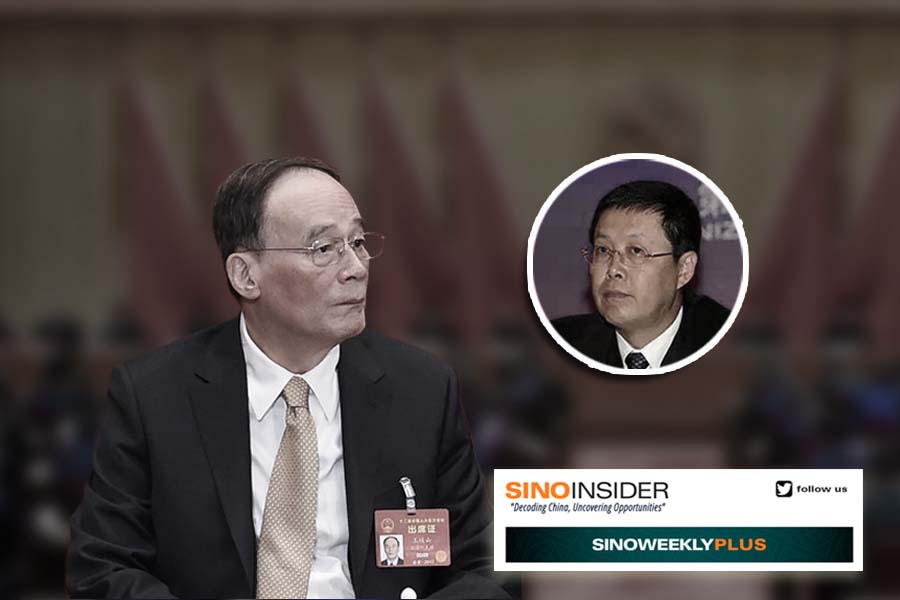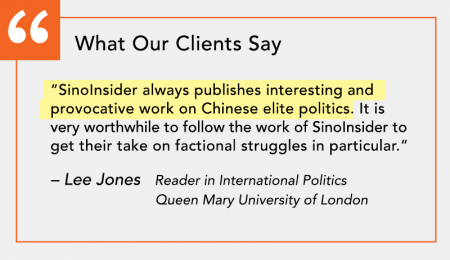◎ The following analysis was first published in the Oct. 5 edition of our subscriber-only SinoWeekly Plus newsletter. Subscribe to SinoInsider to view past analyses in our newsletter archive.
On Oct. 2, Dong Hong, a central inspection group leader during Xi Jinping’s first term, was placed under investigation for “suspected serious violations of laws and Party rules,” according to the website of the CCP Central Committee for Discipline Inspection and the PRC National Supervisory Commission.
Many China watchers have speculated that the purge of Dong Hong signals a split between Xi and close ally Wang Qishan. They noted that Dong and Wang were once colleagues and the former was also appointed group leader of a central inspection group (sub-ministerial level) when the latter spearheaded Xi’s grinding anti-corruption campaign. They also pointed out that Dong’s investigation followed the recent sentencing of Wang’s friend Ren Zhiqiang to 18 years in jail.
Our take:
1. Based on our research, the probe of Dong Hong hints at escalation in the CCP factional struggle. However, Dong’s downfall is very unlikely the result of a “Xi-Wang split.”
2. A look at Dong Hong’s career progression from publicly available information indicates that while he and Wang Qishan had a superior-subordinate relationship, their relationship is not patron-client and neither is Dong necessarily a close confidant of Wang.
In the 1980s, Dong Hong served as research office deputy director of the now defunct CCP Central Advisory Commission (CAC), and was also secretary to Bo Yibo, the CAC executive deputy director. Then paramount leader Deng Xiaoping established the CAC in 1982 ostensibly to provide “political assistance and consultation” to the CCP Central Committee. In reality, the CAC was a sort of transitional organ to “rehabilitate” elite, elderly cadres who were purged during Mao’s Cultural Revolution.
After the CAC was dissolved in 1992, Dong Hong was transferred to Guangdong where he served as assistant to the mayor of Foshan City, director of the Institute of Contemporary China Studies, and director of the Guangdong provincial government’s Development Research Center.
Near the end of 1997, Wang Qishan was appointed deputy governor of Guangdong to deal with insolvency issues at state-owned enterprises. In 2000, Wang and Dong Hong were colleagues for a couple of months in the Guangdong government when the latter was promoted to provincial deputy secretary general. After that, Dong served under Wang as a deputy aide (bureau level) in a number of jobs, including at the PRC State Council General Office of Economic Reform (director of the Industrial Systems Department), Hainan (provincial deputy secretary general), and the Beijing municipal government (municipal deputy secretary general).
In March 2006, Dong Hong served as deputy director of the Central Committee’s Literature Research Center, a sub-ministerial level post. For the rest of his career, Dong would advance no further in official rank, and would remain at the Literature Research Center until 2013. Meanwhile, Wang Qishan became a Politburo member in October 2007 at the 17th Party Congress. In March 2008, Wang became one of the State Council’s four vice premiers.
At this juncture, it is clear that Dong Hong and Wang Qishan are not close and do not share a patron-client relationship. The highest position Dong held under Wang was the assistant aide role of deputy secretary general, not the top aide and confidant position of secretary general. Also, Dong’s political career had plateaued at age 53 when he became deputy director of the Literature Research Center, a department with no real power. If Dong was a true “client” of Wang or a close confidant, he should have either been named top aide to the vice premier (Wang) or promoted and appointed to an important office. Instead, Dong was effectively “frozen out” career-wise, which suggests that Wang did not find him suitable enough to serve as an aide to an elite official or be trusted with higher office.
In November 2013, Dong Hong, who had reached the retirement age for his official rank (60), was appointed deputy head of the second Party Central inspection Group. In 2014 and 2015, Dong would be appointed group leader of the 12th central inspection group, which was tasked with inspecting Fudan University, Jiangsu Province, and the energy SOE Shenhua Group. In July 2017, Dong accompanied Wang Qishan to Hebei Province for inspections as central inspection group leader and fifth team leader of the CCP General Office research and investigation unit, according to mainland media reports. What became of Dong Hong after July 2017 is unclear due to a lack of publicly available information.
We established above that Dong Hong and Wang Qishan are not in a patron-client relationship. So why would Wang and Xi Jinping tap Dong for important anti-corruption work? As we explained in previous analyses, Xi did not have his own faction before taking office in 2012 and a ready pool of supporters to call upon. Concurrently, Xi could not trust officials who are loyalists or supporters of the Jiang Zemin faction (this can be discerned to a degree by tracking the career trajectory of officials and spotting patron-client relations) with important tasks. An analysis of officials preferred by Xi for key posts reveals a number of them have minimal Jiang faction influence over their career or were marginalized (overlooked for promotion, sidelined to “sinecure” posts, etc.) during the Jiang faction’s era of dominance from 1997 to 2012 (we identify Xi’s other criteria for selecting officials here). Dong Hong happens to fit both mentioned criteria, with the added “bonus” of being a retirement-age official (and in theory, less susceptible to being swayed by political interests or corruption in doing a job).
3. The notion that there is a “Xi-Wang split” is debunked by the lack of patron-client relationship between Dong Hong and Wang Qishan. In a previous newsletter, we also explained why the Ren Zhiqiang case has little bearing on the Xi-Wang relationship.
The Xi-Wang political alliance is built on firm ground due to personal ties and deeply intertwined interests. Xi Jinping and Wang Qishan were acquainted in their sent-down youth days during the Cultural Revolution, and became close allies during Xi’s first term in office. Then, Wang greatly aided Xi’s power consolidation and purge of the Jiang faction through strict implementation of the anti-corruption campaign. Xi cannot isolate and attack Wang now without discrediting the anti-corruption campaign and undermining his own political legitimacy. Meanwhile, Wang does not pose a threat to Xi’s paramount leadership given his age and lack of real power in the regime (Wang may be PRC vice president, but he is not even a Central Committee member). If anything, Wang needs to keep backing Xi to preserve his own political legacy; undermining Xi is tantamount to undermining himself.
Xi’s rivals, however, have great interest in turning the pair against each other. Given the centrality of the anti-corruption campaign in the political mythos surrounding Xi, a genuine “Xi-Wang split” would become a modern day “Lin Biao affair”; the purge of Wang Qishan will leave the Chinese people questioning the credibility of Xi’s anti-corruption effort and the legitimacy of the Communist Party. Thus, the “anti-Xi coalition” sees benefits in keeping alive and promoting the “Xi-Wang split” narrative even if there is no real disagreement between the two. However, it should be noted that not everyone who is talking about a “Xi-Wang split” are elements of the “anti-Xi coalition.”
4. There are several possible reasons for why Dong Hong was purged. Dong could be genuinely involved in serious corruption (taking bribes while serving in the central inspection groups, for instance). Also, opponents of Xi in the anti-corruption agency could also be taking advantage of the Dong-Wang connection to play up the “Xi-Wang split” narrative and stir trouble for Xi ahead of the upcoming Fifth Plenum; while such efforts have little chance of damaging the Xi-Wang alliance, they are capable of shaping public perception (and by extension those of foreign governments and powerful interest groups) to Xi’s detriment.
Xi relied on the anti-corruption campaign and agency to consolidate power, but not everyone inside is an ally. We previously noted that CCDI head Zhao Leji is somewhat politically suspect given his ties with recalcitrant officials in Shaanxi Province.














